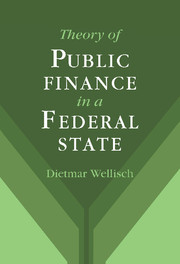Book contents
- Frontmatter
- Contents
- Acknowledgments
- 1 Fiscal Decentralization: Benefits and Problems
- 2 Locational Efficiency and Efficiency-Supporting Tax Systems
- 3 Perfect Interregional Competition
- 4 Interregional Tax Competition for Mobile Capital
- 5 Optimal Structure of Local Governments
- 6 Incentive Equivalence through Perfect Household Mobility
- 7 Efficiency and the Degree of Household Mobility
- 8 Decentralized Redistribution Policy
- 9 Decentralization and Intergenerational Problems
- 10 Informational Asymmetry between the Regions and the Center
- 11 Conclusions
- References
- Index
3 - Perfect Interregional Competition
Published online by Cambridge University Press: 04 December 2009
- Frontmatter
- Contents
- Acknowledgments
- 1 Fiscal Decentralization: Benefits and Problems
- 2 Locational Efficiency and Efficiency-Supporting Tax Systems
- 3 Perfect Interregional Competition
- 4 Interregional Tax Competition for Mobile Capital
- 5 Optimal Structure of Local Governments
- 6 Incentive Equivalence through Perfect Household Mobility
- 7 Efficiency and the Degree of Household Mobility
- 8 Decentralized Redistribution Policy
- 9 Decentralization and Intergenerational Problems
- 10 Informational Asymmetry between the Regions and the Center
- 11 Conclusions
- References
- Index
Summary
In Chapter 2 we derived a complete set of tax instruments, one that allows regions to achieve the efficient allocation. However, we have not yet discussed how regions choose their tax instruments and how they supply local public goods and factors. In other words, it is an open question whether decentralized government decisions result in an efficient allocation. To answer this question, the behavior of regional decision makers must be explained. Moreover, in order to derive a corrective central government intervention, it is necessary to know the behavior of regional governments. If decentralized tax and expenditure decisions lead to an inefficient allocation, the center must know the behavior of regional policy makers. Otherwise, the intervention cannot be successful.
By describing the behavior of small regions, this chapter starts with possible explanations of how regional governments choose their policy measures. There is perfect interregional competition for mobile individuals and mobile firms. Such a starting point seems reasonable insofar as no role is played by the strategic behavior of individual regions; policy measures performed by one region cannot affect other regions. This provides a strong parallel to decentralized decisions of households and firms under conditions of perfect competition. Following the first theorem of welfare economics, household and firm decisions result in an efficient allocation under these conditions. Therefore, the question arises as to whether this conclusion can be extended to decentralized government decisions if regions face similar conditions.
- Type
- Chapter
- Information
- Theory of Public Finance in a Federal State , pp. 40 - 57Publisher: Cambridge University PressPrint publication year: 2000
- 2
- Cited by



